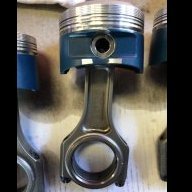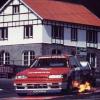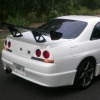Announcements
-
Similar Content
-
Latest Posts
-
By joshuaho96 · Posted
1. Factory knock sensors for now, honestly the RB26 OEM knock sensors seem ok as they're flat response instead of resonant type but they appear to be internally grounded to the block. If I do replace the sensor it would just be to get ones that are not internally grounded so a differential input can be used to reject common mode noise. Definitely plan on fixing this as a part of the tuning process. 2. Never deliberately induced knock, though I guess I could try that experiment if I really wanted to. 3. All of this is basically on a stock engine + ECU, only modification is HKS GTIII-SS turbos and a Nismo plenum. Currently I run it with the wastegate solenoid unplugged so it won't try to raise boost past wastegate pressure. -
That's a given! Bit hard to powdercoat it properly without removing them! 😁
-
By Dose Pipe Sutututu · Posted
No detail on compressor or turbine sizes, which doesn't help with housing size selection with that kit. However, from SR20DET mucking about and money torching perspective, a GTX2860R Gen 2 w/ 0.64 (46mm inducer) will do ~260kW on E85 about 1.5bar of boost. All in before 3000pm, which cause a gearbox to shatter. Now imagine the same turbo, on a modern motor with an extra 0.5L of displacement, and heaps of cam timing adjustability (not an on/off affair like the Nissan shit boxes). If this was my car (which I would never own or consider buying, ever!), I would go for a nice twin scroll setup, and a G30-660. Gates plumbed back, no silly shit. Lean on the cam timing, big displacement to create a flat-ish torque curve.
-






Recommended Posts
Create an account or sign in to comment
You need to be a member in order to leave a comment
Create an account
Sign up for a new account in our community. It's easy!
Register a new accountSign in
Already have an account? Sign in here.
Sign In Now